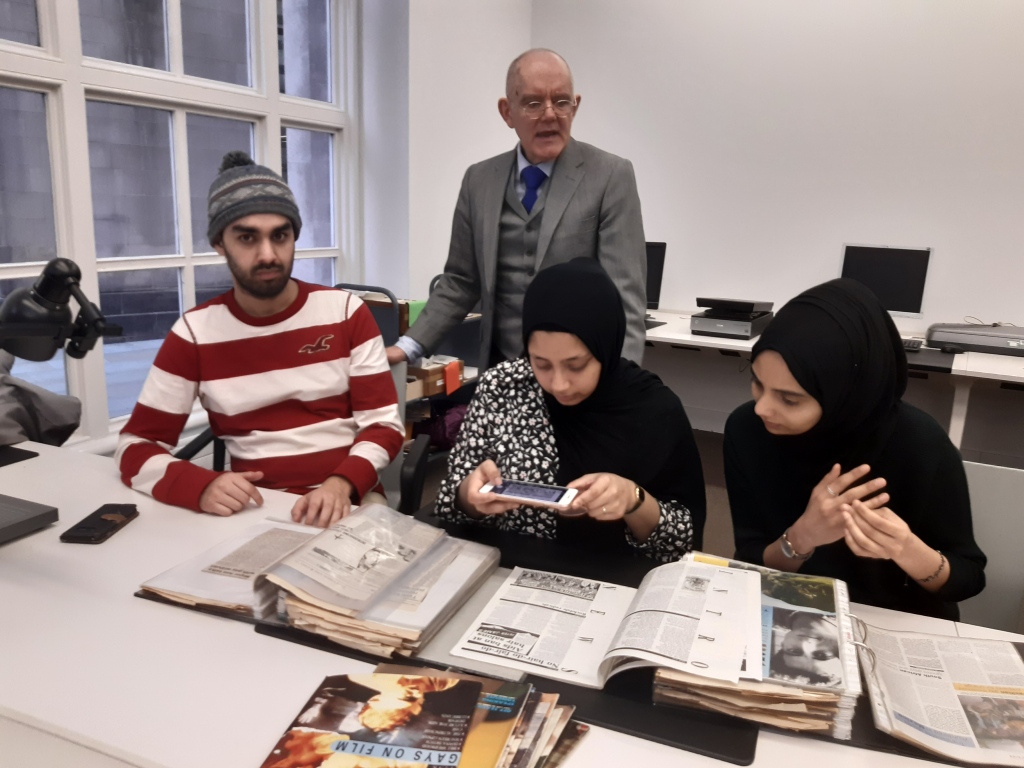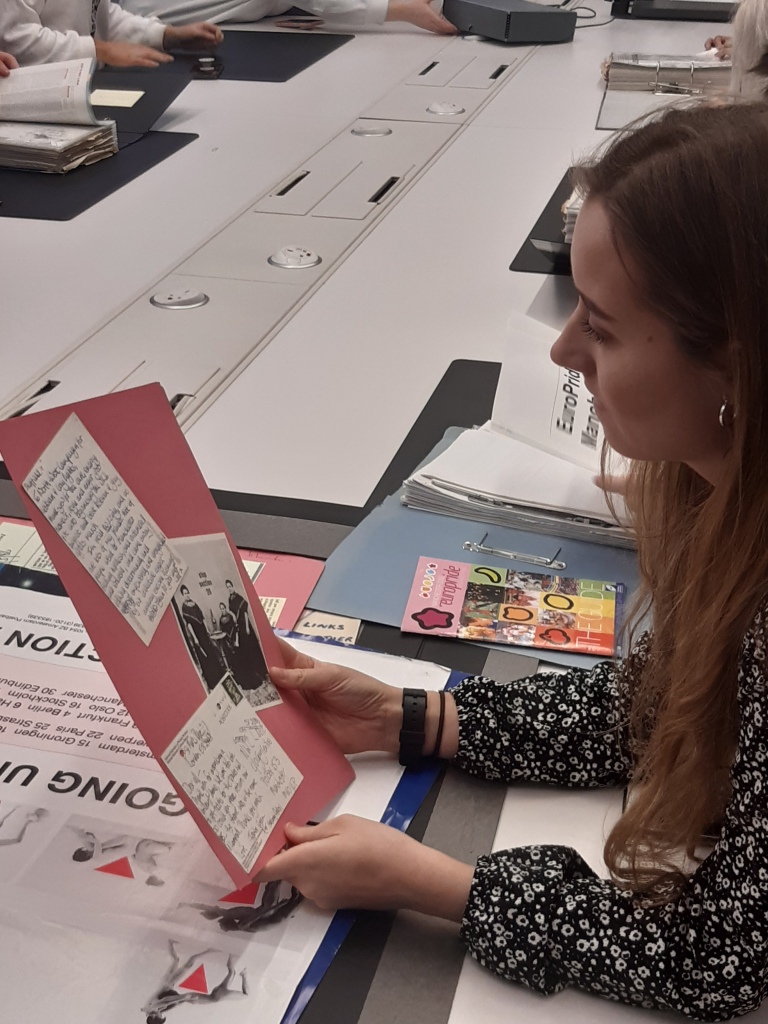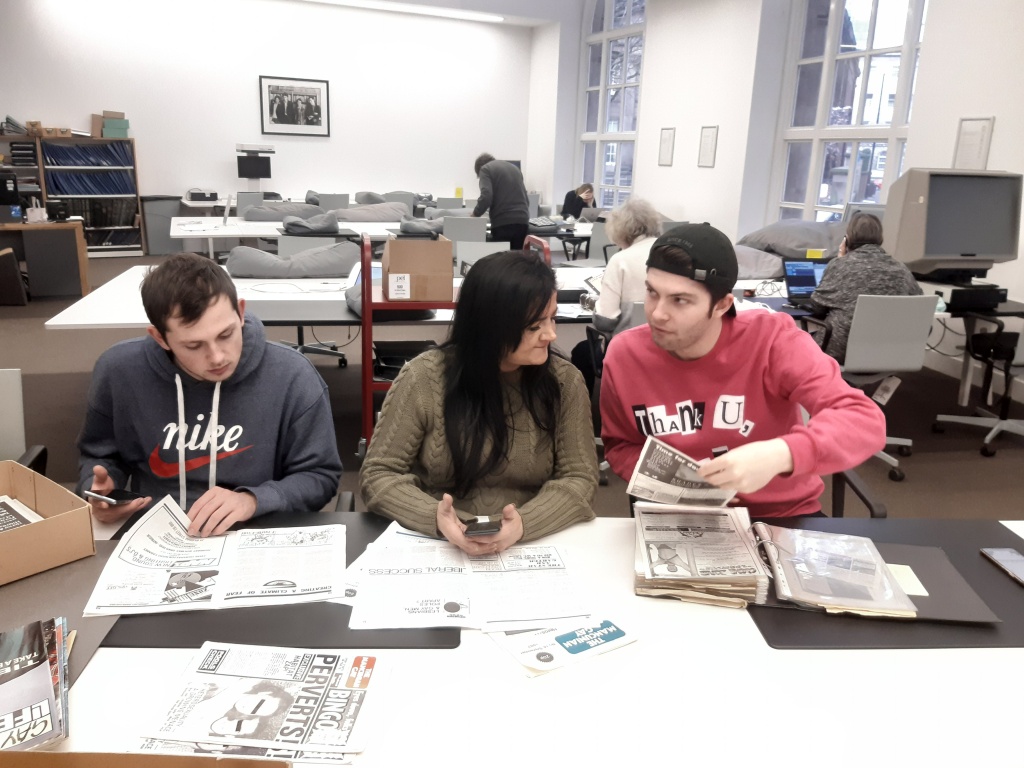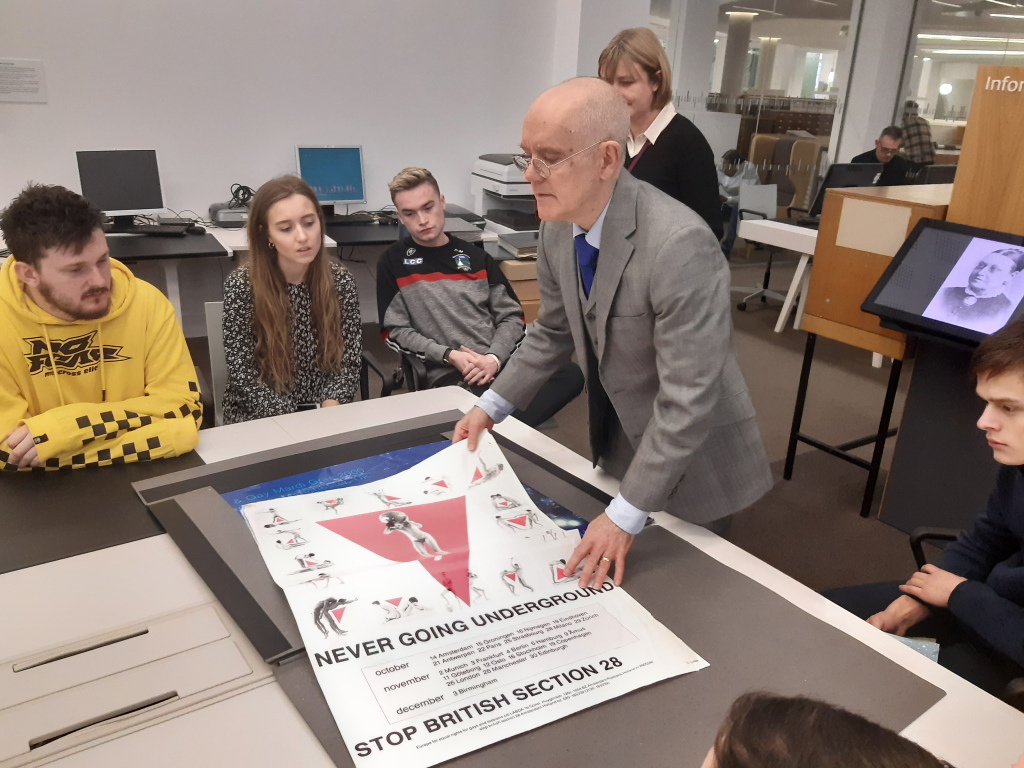University of Manchester History PGCE
by Thomas Donnai, University of Manchester History PGCE and Dr. Jeff Evans, Manchester University, Schools OUT UK.
Visits to countless schools over the past 3 years, and scrutiny of countless curricula seem to confirm one thing to me: we don’t ‘do’ LGBT History very well in schools. Of real concern is that for most students, ignorance is reinforced by the near absence of LGBT History from the National Curriculum (it is left to forward thinking departments to improvise and ‘weave in’ LGBT+ histories into their curricula). There are , therefore, missed opportunities for a richly diverse reading of the past, of which LGBT+ History is an excellent and important example. Past attitudes to human sexuality and gender are an obvious starting point for departments wishing to make their teaching of History more inclusive. Most standard KS3 & KS4 schools history textbook endorse this deafening silence with, at best, a handful of tokenistic insights attempting to cover, amongst others, Women’s History and Black History. The ignorance is further buttressed by the lack of training for our new teachers on how to make marginalised groups visible in the History curriculum.
However, most History teachers (certainly in my experience) agree that an inclusive reading of the past in not only academically sound (i.e. providing a more reliable history) but also provides students with excellent preparation for adult life, challenging harmful stereotyping and contextualising and appreciating our societies rich diversity.
Why doesn’t this always happen then?
Practical Professional Problems:
- As is often the case, the two pressing factors seem to be time and expertise. Teachers’ professional lives are incredibly busy and the job of writing and resourcing good schemes of work is a big one.
- The question of expertise is also significant. Many teachers (including my trainees) sometimes feel that they are ‘imposters’ when addressing an area of History, they have little experience teaching. This is a proper and common concern, especially when considering what might be seen as ‘sensitive’ history topic. The desire to ‘play it safe’ often leads to a type of pedagogic conservatism which often looks like repeating or refining what others in department do or have done. Put bluntly, teachers often don’t feel confident in addressing LGBT+ History and are conscious of being clumsy or insensitive in their planning and delivery.
- Currently this problem is further aggravated by the limited number of courses available ( undergraduate and postgraduate) that adequately cover the teaching of LGBT History in the secondary school setting. This means that most if not all current and trainee History teachers have little or no knowledge of LGBT+ History or access to such reading of the past, its bespoke methodology, nomenclature and historiography.
Therefore, trainees often arrive on PGCE programmes share with a lack of insight and need support in developing their thinking on approaches to teaching LGBT+ History.
Political ‘Narrowing’ of the History Curriculum
The content for GCSE History has been broadened significantly since the new specifications were introduced in 2017, meaning that many schools are now opting for a two-year Key Stage 3 and electing for a three year GCSE programme. This puts extra pressure on departments to ‘cover’ significant tranches of the past, and means that many History departments are being forced to narrow, not grow their curricula. The price of a performative and results – driven culture in education is sometimes a thin and watery curriculum.
In an attempt to improve this aspect of my own PGCE History programme, I contacted the LGBT Foundation back in September, and spoke with Sue Sanders (Chair of School Out(UK) and the best established LGBT+ Education Charity) about accessing expertise in the area. She put me in touch with Dr Jeff Evans, Research Fellow at John Moores University, and founder of the ‘Outing the Past’ festival, and active campaigner for LGBT+ and human rights for the past 40 years. Jeff is one of the most prominent voices in the drive to bring an inclusive reading LGBT History to our classrooms and our collaboration thus far has been one of the highlights of the PGCE History programme.
The notion of expertise cropped up immediately when Jeff and I mapped out the session in mid-September. Jeff pointed out that, where LGBT History is concerned, expertise does often not exist in schools and the challenge of diversity proponents to place the PGCE Historians in a position where they would become the experts. The theme of teacher agency and taking control of curriculum development came up again and again when Jeff delivered his inspirational session in January. What follows is a summary of Jeff’s work with the PGCE Historians at the University of Manchester and some ideas for where we’re planning to take this collaboration next.
The aims of the session were threefold:
1] To provide the students with a definition for LGBT History and to consider what it might look like in a classroom context
2] To explore how we can teach LGBT History and the potential obstacles
3] To begin production of a series of lessons on LGBT History to share with other teachers and to add to the bank of resources at ‘The Classroom’ website http://the-classroom.org.uk/category/the-materials-to-use/by-subject/History/schools-out-history-lessons/
Outline of the session and trainee learning
Jeff’s session began with a quotation that immediately stimulated a lively discussion and focused the PGCE students’ thinking. Jeff’s definition of inclusive history is as follows:
“Any and all readings of the past that lights-up those areas of our past (i.e. previously marginalised or excluded groups from ‘official’ history) are essential to gaining a more inclusive, accurate and thereby more relatable reading of our collective past.”

Once we had agreed a loose definition LGBT+ History and had completed a timeline activity exploring LGBT History from a chronological perspective, discussions about the current state of LGBT History teaching in schools followed. LGBT+ histories are often hard to locate because they are frequently entirely absent from schools’ schemes of work. The importance of oral testimony and archive material are clearly key here, and this led us to fieldwork location one: the archives at Manchester’s Central Library.

The PGCE History trainees spent time exploring a range of primary source material and considered how the source material could be placed at the centre of the lessons they were to devise. Excerpts from local and national press over the past 30 years helped to give the trainees an idea of the prevalence of homophobia in the mainstream media and to also chart changing views over time, and many of the trainees opted to use selected excerpts as the starting points of their lessons. In looking at contemporary examples of opposition to and protest against Section 28, trainees were able to identify some excellent source material to bring into the classroom.

Section 28, a piece of legislation introduced by Margaret Thatcher’s Conservative government, stated that local authorities were not allowed to “intentionally promote homosexuality or publish material with the intention of promoting homosexuality”. Many of the students were unaware that such legislation existed so recently and were also surprised by the openly hostile nature of pieces in national broadsheets and tabloids towards he LGBT community. The value of working with source material like this soon became evident. The impact of touching and working with these artefacts stands in stark contrast to what many teachers are forced to do: mining source material from the internet. The impact and relevance of each piece of history was heightened and I’m now considering starting the PGCE History course with an exploration of the many archives that Manchester has to offer. Every trainee left Central Library with a selection of 2-3 sources that they would then form their lessons around.

Next stop was the People’s History Museum for more exploration of the archives. The trainees unearthed a rich seam of material and lesson plans were further refined and discussed. We were treated to a tour of the archives unearthed a couple of gems, including the 1945 Labour Party Manifesto and a variety of brilliant primary sources that helped illustrate ‘hidden’ stories from with the LGBT community in Manchester.

Follow up, feedback and next steps for the collaboration
Back at University in the afternoon, work commenced on the trainees’ lesson plans; the range of foci was astonishing and the incorporation of source material from both libraries led to some outstanding discussion and debate. The lessons won’t necessarily serve as a cohesive, chronological scheme of work, but rather as a series of ‘stand alone’ lessons exploring different aspects of LGBT History. We’re looking forward to sharing our resources with the history teaching community on ‘The Classroom’ website when our materials go live in February: http://the-classroom.org.uk/category/the-materials-to-use/by-subject/History/schools-out-history-lessons/
Trainee evaluations established that many of the desired outcomes had been met, and provided further food for thought in shaping the session in years to come; it is my intention to enshrine Jeff’s session in the History PGCE curriculum and to continue to modify it over the years. Some soundbites on the positives are given below:
‘Amazing opportunity to look at archives I previously would not have seen’.
‘Mighty inspiring and eye opening. I really hope I can implement some aspects of this into the classroom! ‘
‘I thoroughly enjoyed this session and I am looking forward to implementing what has been learnt’.
‘Now have a a new understanding of how important inclusion of LGBT content can be for some students in term of representation and visibility’
I’ve now got the knowledge of where to find LGBT resources locally’
Next steps are clear from an examination of the feedback – see the ‘even better ifs’ below:
‘Lesson planning was a bit stressful; I feel like I need more contextual knowledge’.
‘It’s difficult to really know how to implement different methodologies with clear examples but that’s just the fault of the lack of resources’.
’Would have enjoyed some more time with Jeff on planning lessons and also on theory and historiography’
Inclusive History and curriculum building has been one of the prominent issues the PGCE Historians have been working on this year, and whilst none of the trainees profess to be the finished article, I’ve seen them come a long way since September. If nothing else, they are now asking the right types questions of the existing curricula they teach, and are thinking about how to make their own teaching of History more inclusive and more relevant to their students.
Have we created ‘experts’? That’s debatable. Have we prepared the trainees to bring new knowledge, insights and perspectives to the teaching of LGBT History? Absolutely. Here’s to continuing work with Jeff and the University of Manchester PGCE History course.

